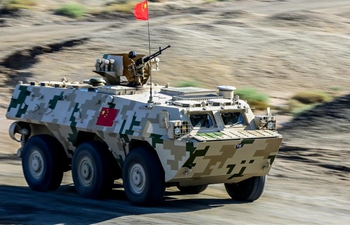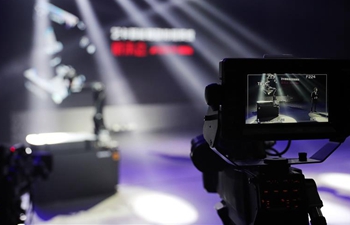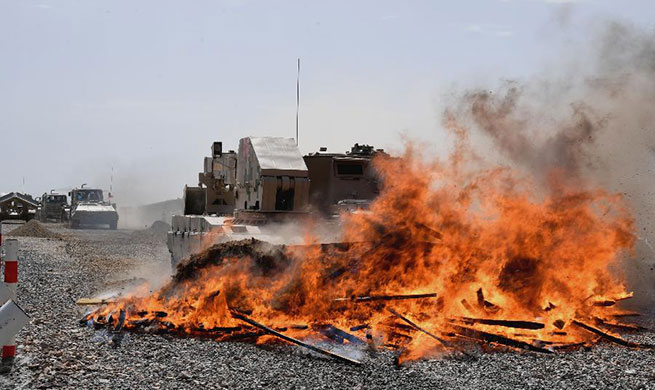ISTANBUL, Aug. 9 (Xinhua) -- Despite the rising tension in the Turkey-U.S. ties due to Turkey's detention of a U.S. pastor, Turkish experts remain optimistic that the two NATO allies could reach a compromise.
"I don't expect a rupture in the ties with the United States," Huseyin Bagci, a professor of international relations at the Middle East Technical University, told Xinhua.
Tension has been rising in recent weeks after a Turkish court placed American pastor Andrew Brunson under house arrest in late July despite Washington's demand for his release.
Many in Turkey feel a swap deal may well be reached for Brunson, an evangelical pastor, as a large Turkish delegation held talks on Wednesday with their U.S. counterparts.
Bagci argued that the damage in the bilateral ties is not irreversible, saying that "this (escalation) was a forest fire, and now water is being poured down on the forest."
In a rare retaliatory move, the U.S. imposed early the month sanctions on Turkey's justice and interior ministers. Ankara responded by freezing any assets U.S. interior and justice ministers in Turkey.
Brunson, who has been under arrest since October 2016, is charged with espionage as well as helping the outlawed Kurdistan Workers' Party (PKK) and being linked to those who were involved in the failed coup attempt of 2016 in Turkey.
The reciprocal sanctions by Turkey and the U.S. "make the resolution of the Brunson case seemingly harder," said Faruk Logoglu, a former ambassador to the U.S.
But Logoglu added that a deal on Brunson is still possible, given the continuing diplomatic activities.
The Turkish delegation, headed by Deputy Foreign Minister Sedat Onal, includes three officials from each of the foreign, justice and finance ministries. The Turkish officials had meetings with officials from the U.S. State and Treasury Departments.
It is widely argued that Turkey's state-run Halkbank and its former deputy general manager, Hakan Atilla, who is in prison in the United States, may be part of a swap deal for the cleric.
Atilla was convicted earlier this year of having violated previous U.S. sanctions on Iran, which Ankara has denied.
"If and when the pastor returns home -- which could be soon according to credible reports in the media -- then there might be a chance for the two allies to delve into more challenging issues," said Logoglu.
Logoglu, however, is concerned that the Turkey-U.S. ties could continue to worsen if no compromise is reached soon.
"There is a significant chance of a meltdown in the relationship, if the Brunson case remains unresolved," he warned.
Logoglu also feels the Brunson case currently overshadows the more substantive strains in the Turkey-U.S. relations.
The most daunting challenge will be the U.S. sanctions on Iran and the related congressional threat of banning Turkey from receiving loans from international bodies such as the International Monetary Fund, he said.
"Anyone doing business with Iran will not be doing business with the United States," tweeted U.S. President Donald Trump on Tuesday.
Bagci does not think Ankara would back off and agree to comply with the U.S. sanctions on Iran.
However, Bagci is optimistic that Ankara could manage to obtain exemption as it was the case for Turkey when the Obama administration imposed sanctions on Iran to force the energy-rich country to reach a nuclear deal.
In a bid to increase pressure over Ankara, the U.S. Senate's Committee on Foreign Relations passed a bill at the end of last month that calls for blocking future loans Turkey may seek from international financial organizations.
The Turkish delegation's visit to the United States reveals both sides' readiness to settle issue through diplomacy, Bagci said.
Top Turkish officials have repeatedly said Ankara would not bow to the U.S. threats.
A day before the U.S. Senate passed the bill, Turkish President Recep Tayyip Erdogan warned that "the U.S. should keep in mind that it would lose a strong and sincere ally like Turkey if it would not change this (threating) attitude."
Erdogan also denounced Washington's steps regarding the evangelical cleric as disrespectful and not suitable for a strategic partner.
Despite the mounting tension between the two NATO allies, Turkish officials continue to refer the U.S. as a strategic partner.
Celalettin Yavuz, a security and foreign policy analyst, said the Turkey-U.S. rift is controlled.
Turkish officials should use diplomacy to sort out the problems rather than publicly the U.S., Yavuz said, noting that it is the Turkish economy that significantly suffers due to the ongoing confrontation.
"So, the confrontation works to our detriment," said Yavuz, who teaches at Istanbul Ayvansaray University.
Turkey should act realistically, he stressed, arguing diplomacy could work out a swap deal for the Brunson case.

















